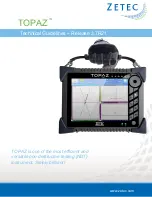
COMBITEST422
EN - 96
Check that the insulation resistance of the installation complies with the requirements of
the applicable guidelines. This test has to be performed with the circuit being tested not
powered and with the possible loads it supplies disconnected.
Allowable values
The values of the measured voltage and of the minimum insulation resistance can be
taken from the following table.
Circuit nominal voltage [V]
Test voltage [V]
Insulation resistance
[M
]
SELV and PELV *
250
0,250
Up to/equal to 500 V, except for the above-
mentioned circuits
500
1,000
Over 500 V
1000
1,000
* The terms SELV and PELV replace, in the standards
’ new wording, the old definitions of “Very
low safety voltage” or “Very low functional voltage”.
Table 3: Most common test types, insulation resistance measurement
Parts of the system to be checked
Check the insulation resistance between:
➢
Each active conductor and the earth (the neutral conductor is considered as an active
conductor except in TN-C power supply systems, where it is considered as part of the
earthing (PEN)). During this measurement, all active conductors may be connected to
each other. Should the measurement
’s result be outside the limits prescribed by the
standards, the test must be repeated separately for each single conductor.
➢
The active conductors. The guidelines recommend also checking the insulation
between active conductors when possible.
If the system includes electronic devices, it is necessary to disconnect them from the
system to prevent any damage. Should this not be possible, only perform the test between
active conductors (which, in this case, must be connected to each other) and the earth
connection.
In the presence of a very extended circuit, wires running side by side constitute a capacity
that the instrument must load in order to obtain a correct measurement; in this case, it is
advisable to hold the start button of the measurement (in case you run the test in manual
mode) until the result is stable.
The "
> full scale
" message indicates that the insulation resistance measured by the
instrument is higher than the maximum measurable resistance; this result is obviously
much higher than the minimum limits indicated in the standard table above, so the
insulation at that point is to be considered compliant.
12.2.1. Measurement of polarization index (PI)
The purpose of this diagnostic test is to evaluate the influence of the polarization effects.
Upon the application of a high voltage to insulation, the electric dipoles distributed in the
insulation align in the direction of the applied electric field. This phenomenon is called
















































